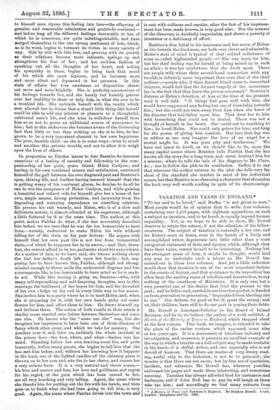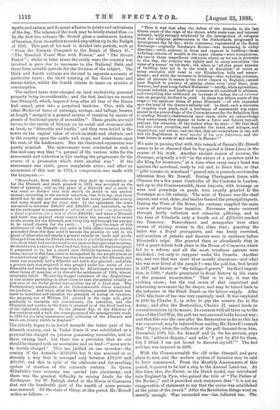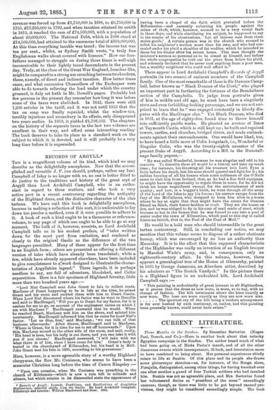TAXATION AND TAXES IN ENGLAND.* " To tax and to
be loved," said Burke, " is not given to man." Most people would be of opinion that to write four volumes, containing over 1,450 pages, with eighteen appendices, on such a subject as taxation, and to be loved, is equally beyond human capability. Yet, as we hope to be able to show, Mr. Dowell deserves to retain the esteem, if not the affection, of his fellow- creatures. The subject of taxation is naturally a dry one, and its history must at times, even in the hands of a lively and accomplished writer, degenerate into little other than a mere categorical statement of facts and figures, which, although they have their value, cannot be said to be interesting. Nothing but the strongest sense of duty, it might be thought, would lead any man to undertake such a labour as Mr. Dowell has carried out in these four volumes. And yet a little reflection would show that taxation is one of the most important factors in the events of history, and that resistance to its imposition has often been the exciting cause of rebellion and insurrection, to say nothing of the overthrow of Ministries. It is only one, but a very powerful one, of the chains that bind the present to the past ; and its hither end, carried in our breeches-pocket, is handed on from generation to generation, "bequeathed from bleeding sire to son." Our fathers, for good or for ill, spent the money, and we, their children, have still to do our part in paying their debts.
Mr. Dowell is Assistant-Solicitor to the Board of Inland Revenue, and he is, we believe, the author of a work entitled, A Sketch. of the History of Taxes in. England, which stopped short at the first volume. This book, we imagine, is intended to take the place of the earlier venture, which appeared some nine or ten years ago. It is a monument of laborious industry and investigation, and, moreover, it presents an excellent example of the way in which a treatise on a dull subject may be made readable in the hands of a skilful writer, and one especially who is not devoid of humour. That there axe wastes of very dreary read- ing, useful only to the historian, is not to be gainsaid; the wonder is that there are not more ; but by free use of quotation, incident, and reference, Mr. Dowell has, wherever possible, enlivened his pages and made them interesting, and sometimes amusing. Taxation has 'always afforded food for caricature and burlesque, and if John Bull has to pay he will laugh at those who tax him ; and accordingly we find many extracts from • A History of Taxes and Taxation in England. By Stephen Dowell. 4 rgls. London: Longman and Co. 1885.
squibs and satires, and frequent allusion to prints and caricatures of the day. The scheme of the work may be briefly stated thus:— In the first two volumes Mr. Dowell gives a continuous history of taxation, from its earliest recorded imposition up to the Budget of 1883. This part of his task is divided into periods, such as " From the Norman Conquest to the Reign of Henry II.," " The Hundred Years' War with France," and " The Stuart Period " ; whilst in later times the costly wars the country was involved in gave rise to increases in the National Debt, and these form suitable periods for the division of the subject. The third and fourth volumes are devoted to separate accounts of particular taxes ; the third treating of the direct taxes and stamp-duties, whilst the fourth relates to taxes on articles of consumption.
The earliest taxes were charged on land exclusively, personal property being inconsiderable ; and the first land-tax on record was Danegeld, which, imposed long after all fear of the Danes had ceased, grew into a perpetual land-tax. This, with the other Mediaeval taxes of carucage, scutage, and tallage, became at length " merged in a general system of taxation by means of grants of fractional parts of moveables." These grants are well known to the reader of history, on its social and economic side at least, as " fifteenths and tenths," and they were levied in the towns on the capital value of stock-in-trade and chattels, and in the country upon the cattle and crops, and sometimes upon the rent, of the landowners. But the fractional expression was purely nominal. The assessments were conducted in such a free-and-easy way that " a perusal of the various writs for the assessment and collection is like reading the programme for the course of a procession which went another way." If the assessment was strict, grave complaints arose ; and after an occurrence of this sort in 1334, a compromise was made with the taxpayers :—
" Henceforth, from 1334, the sum thus paid by composition as for the fifteenth and tenth granted in 1334, was accepted as the basis of taxation ; and on the grant of a fifteenth and a tenth it was usual to declare that they should be levied in the ancient manner, according to the ancient valuation, that is to say, that there should not be any new assessment, but that every particular county and town should pay the usual sum. In the aggregate, the sums amounted to between £38,000 and £39,000 ; and henceforth, as far as the exchequer is concerned, a 'fifteenth and tenth' was practically a fiscal expression for a sum of about 239,000 ; and when a fifteenth and tenth was granted every county knew the amount to be raised in the county for the fifteenth, and every city and borough the amount to be raised therein for the tenth. . . . . Upon the basis of this settlement of the fifteenth and tenth in 1334, direct taxation mainly proceeded from this date until it became the practice to add to the grant of fifteenths and tenths a general subsidy on lands and goods. Changed from what the French term a tax de quotiti to a tax de reparti- tion, from what, had not the word at the present day a peculiar meaning, we should term a rate to a fixed land-tax, being, not the fractional grant it purported to be, but a stated sum divisible between certain dis- tricts, the tax in this form came to be regarded by the people almost as of constitutional right. When less than the sum for a full fifteenth and tenth was required, half a fifteenth and tenth was granted ; and when a greater sum was required, it was granted under the name of two fifteenths and tenths, as the case might be. All attempts to introduce other forms of taxation, or to disturb the settlement of 1334, almost invariably failed. We see the dogged insistence of the Englishman in this matter prevailing in after times to turn the general subsidy or new rate of the Tudor period into another tax of a fixed sum. The Parliamentary assessments of the Commonwealth times continued the tradition. And when, after the Revolution, another attempt was made to introduce and establish the principle of rating in taxation, the property-tax of William III., planted in the same soil, grew gradually to resemble the assessments, the subsidies, and the fifteenths and tenths, in the form it attained to of the fixed land-tax of the eighteenth century. To the present day, at the distance of five centuries and a half, the consequences of the arrangements made in 1334 for the local assessment and collection of the fifteenth and tenth are clearly visible in England."
The subsidy began to be levied towards the latter part of the fifteenth century, and in Tudor times it was established as a personal tax charged on persons possessing moveables, and on those owning laud ; but there was a provision that no one should be charged both on moveables and on land—" none are to be doubly charged." This tax yielded on one occasion—the coming of the Armada-2120,000, but it was assessed in so slovenly a way that it averaged only between £70,000 and £80,000, and this in spite of the elaborate and far-reaching system of taxation of the sixteenth century. In Queen Elizabeth's time economy was carried into parsimony, and there was the greatest difficulty in raising funds for the Exchequer. Sir W. Raleigh stated in the House of Commons that not the hundredth part of the wealth of some persons was assessed. Of the state of things at this period Mr. Dowell writes as follows :—
" Thus it was that after the defeat of the Armada, in the last fifteen yoara of the reign of the Queen, while rents rose, and internal industry, lately strongly reinforced by the immigration of refugees from the religious persecutions in the Netherlands, progressed in development day by day; while commerce, represented at the Royal Exchange—originally Gresham's Bourse—was increasing in every direction ; while expense in dress and expense in building—those unfailing criteria of wealth in the upper classes—were conspicuous, the one in those magnificent costumes where, as we see in portraits to this day, the courtier was rightly said to carry sometimes the value of a manor' on his back; the other, in that great bravery of building that set in in the times of Elizabeth,' of which so many examples still exist in our Elizabethan halls and manor- houses ; and while the increase in drinking—that unfailing criterion, alas ! of increase in means in the lower classes in England, carried your English in potency of potting above even your Dane, your German, and your swag-bellied Hollander'—briefly, while agriculture, internal industry, and trade and commerce all combined in advance, and everything else evidenced an increase of riches, the ad valorem rate on property declined in yield. In these last fifteen years of the reign= the spacious times of great Elizabeth ' —all else expanded save the total of the Queen's subsidy roll. In short, such a travestie of taxation took place, such a burlesque of assessment was repre- sented in the proceedings of the Commissioners for the Subsidies, that in reading Bacon's observations upon taxes, while we acknowledge their correctness, they appear to have a force and felicity beyond, perhaps, the intention of the author when he says :—' He that shall look into other countries, and consider the taxes, and tallages, and impositions, and assizes, and the like, that are everywhere in use, will find the Englishman is most master of his own valuation, and the least bitten in purse of any nation in Europe.'
We note in passing that with this remark of Bacon's Mr. Dowell seems to be so charmed that he has quoted it three times in the course of his work. Another ancient source of revenue, the Customs, originally a toll "in the nature of a premium paid to the King for insurance," at a time when every man's band was against the merchant, ready to rob and to fleece him, so that " pille comma un marchand " passed into a proverb, receives due attention from Mr. Dowell. During Plantagenet times, with Chaucer for a few years Controller of the Customs in London, and up to the Commonwealth, these imposts, with tunnage on wine and poundage on goods, were usually granted to the Sovereign as a life subsidy. The wine of France was the chief import, and wool, skins, and leather formed the principal exports.
During the Wars of the Roses, the customs supplied the main source of revenue from taxation. Enormous waste occurred through faulty collection and extensive pilfering, and in the time of Elizabeth only a fourth out of £200,000 reached the Treasury. Benevolences and monopolies were other means of raising money in the olden time ; granting the latter was a Royal prerogative, and was freely exercised, and numbers of patents and licences were in existence before Elizabeth's reign. She granted them so abundantly that in 1601 a great debate took place in the House of Commons, which led to a reform, and all the most vexations patents were abolished ; but only to reappear under the Stuarts. Another tax, and one that was more than usually obnoxious—and what tax was ever loved of the people P—was the poll-tax, first levied in 1377, and known as " the tallage of groats." Its third imposi- tion, in 1380, " stands prominent in fiscal history as the cause of the peasant insurrection." That is to say, it was the exciting cause ; but the real cause of that important and interesting movement lay far deeper, and may be traced back to the influence of the Black Death on the labour supply. After 1380, this form of tax was very sparingly used. It was employed in 1641 by Charles I., in order to pay the arrears due to the Army ; and after the Restoration, Charles II. raised funds on several occasions by its means. In common with all taxes up to the time of the Civil War, the poll-tax was assessed in the loosest way; and that this was the case after the Restoration as far as this tax was concerned, may be inferred from reading Mr. Dowell's remark that " Pepys, when the collectors of the poll demand from him, December, 1660, 10s. for himself and 2s. for his servant, pays the 12s. without dispute ;' and adds, I put by £10 for them, but I think I am not bound to discover myself." The last poll-tax was imposed in 1698.
With the Commonwealth the old order changed, and gave place to new, and the modern system of taxation may be said to have commenced. From the Monthly Assessments of this period, it proved to be but a step to the Annual Land-tax. At this time, also, the Excise, on the Dutch model, was introduced into England by Pym, who gained the title of " The Father of the Excise ;" and it provoked such resistance that " it is not an
exaggeration of statement to say that the excise was established at the point of the sword." After the Revolution things went on merrily enough. War succeeded war—tax followed tax. The revenue was forced up from £1,750,000 in 1688, to £6,750,000 in 1755, £17,250,000 in 1792, and when taxation attained its zenith in 1815, it reached the sum of £74,500,000, with a population of about 20,000,000. The National Debt, which in 1698 stood at £14,500,000, had attained to the enormous total of £864,000,000. At this time everything taxable was taxed ; the income-tax was ten per cent., whilst, as Sydney Smith wrote, "a truly free Englishman walks about covered with licences." How our fore- fathers managed to struggle on during those times is well-nigh inconceivable to their lightly taxed descendants in the present day. Truly, at the close of the Great War England, Issachar-like, might be compared to a strong ass crouching between twoburdens, those, namely, of direct and indirect taxation. How better times came, and what successive Chancellors of the Exchequer were able to do towards relieving the load under which the country groaned, is duly set forth in Mr. Dowell's pages. Probably but few persons in the present day remember how long it was before some of the taxes were abolished. In 1842, there were still 1,200 articles in the tariff, and it was not until 1853 that the tax on soap was finally repealed, whilst the window-tax, terribly injurious and insanitary in its effects, only disappeared two years earlier. In 1850, it yielded £1,708,502. The chapters on the history of the separate taxes in the last two volumes are excellent in their way, and afford some interesting reading• The book deserves to take its place as a standard work on the subject to which it is devoted, and it will probably be a very long time before it is superseded.




































 Previous page
Previous page